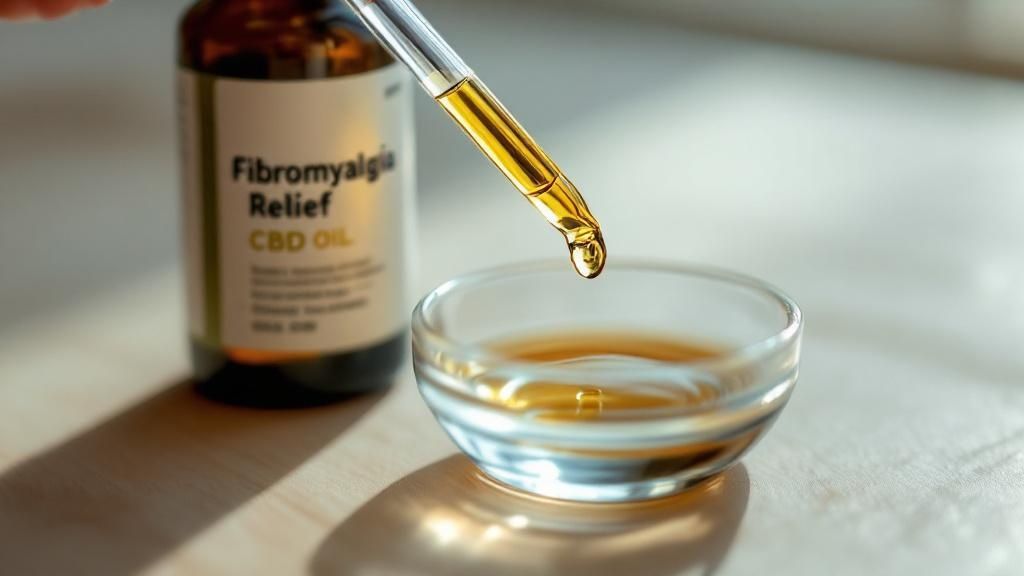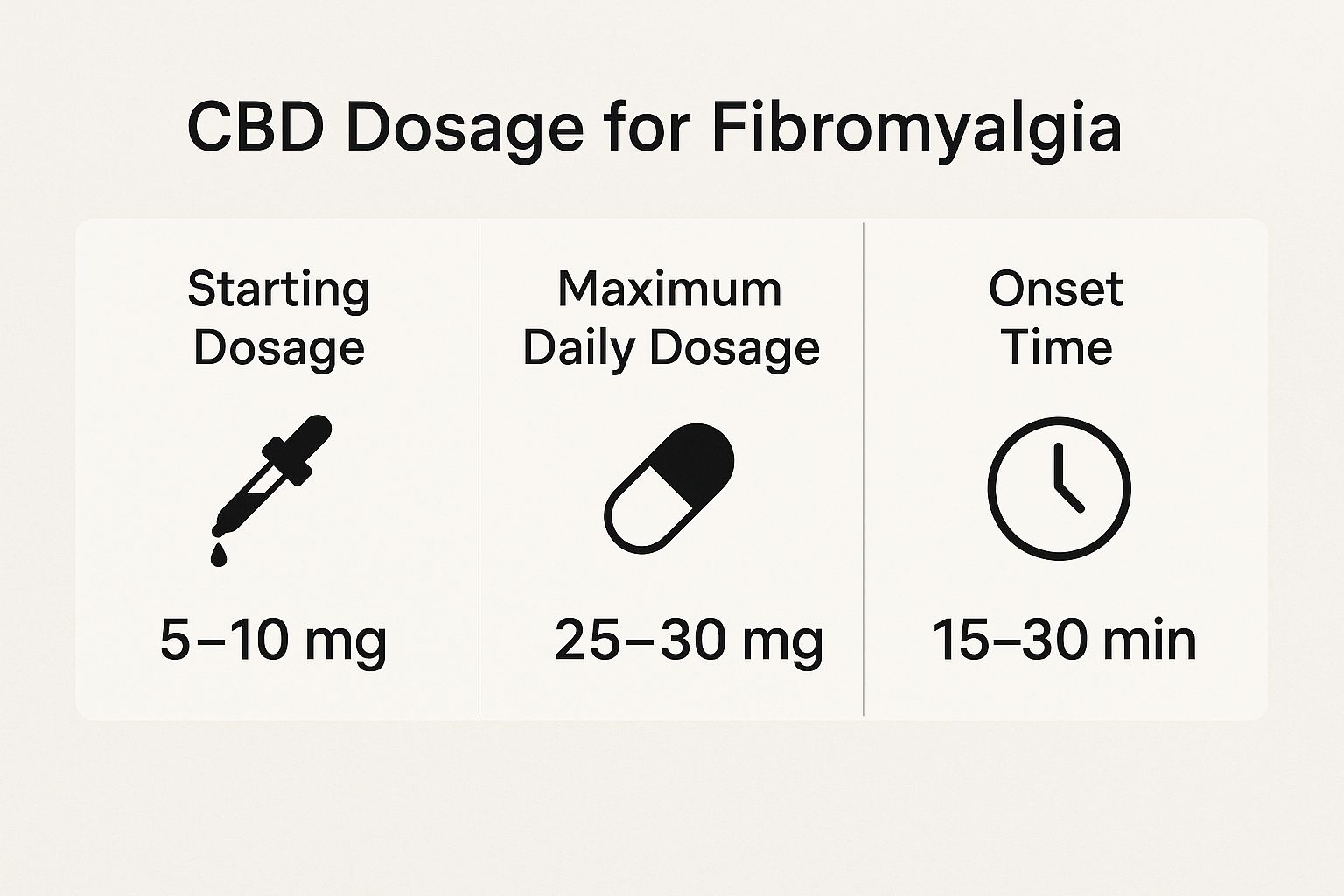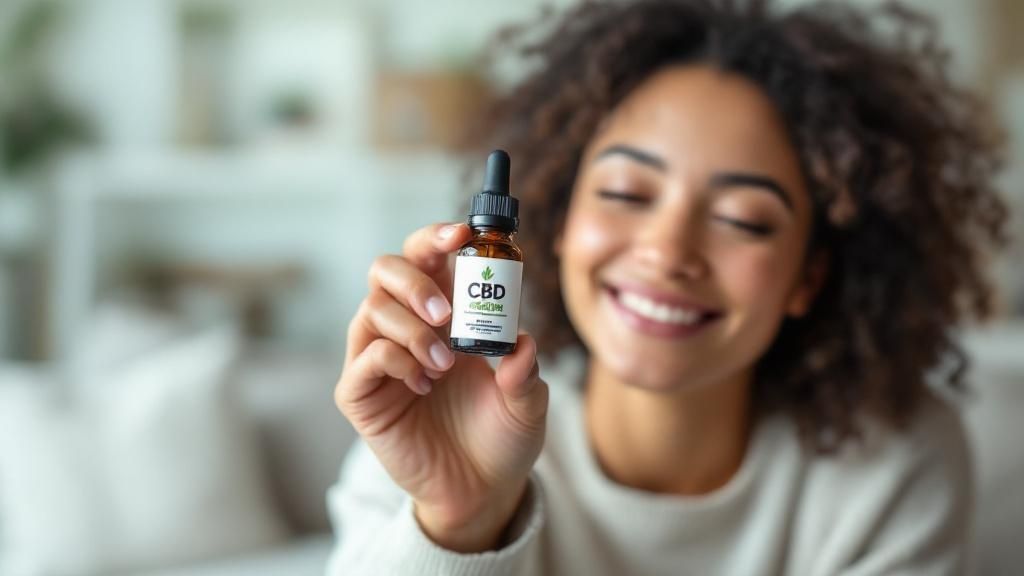When Your Body's Alarm System Won't Turn Off
Imagine your home's smoke detector constantly shrieking, even with no smoke. That's the daily experience for many with fibromyalgia. Their nervous system becomes oversensitive, turning normal feelings into relentless pain. It's as if their body's alarm system is stuck on, keeping them in a state of constant discomfort and tension.
This heightened sensitivity impacts everything. Everyday activities, like a stroll with the dog or a trip to the supermarket, become herculean efforts. The persistent pain can cause fatigue, making it hard to focus at work, nurture relationships, or even find joy in hobbies. This often unseen pain is frequently misunderstood, leaving those affected feeling isolated and defeated.

This screenshot from the NHS website illustrates the widespread pain and fatigue associated with fibromyalgia. The image shows the numerous tender points across the body, highlighting how pervasive this condition can be. It also underscores that fibromyalgia is a recognised medical condition, not just "in someone's head," as some are sometimes led to believe.
Standard pain relievers often fail to address the complex nature of fibromyalgia pain. This is because they typically target inflammation, whereas fibromyalgia is mainly a neurological issue. Think of it like this: common painkillers like ibuprofen might briefly soothe a headache, but they do little to fix the underlying nerve dysfunction causing fibromyalgia pain. This has led many in the UK to explore alternatives, like CBD for fibromyalgia.
The Struggle for Effective Relief
Finding relief can be a long and difficult road. Many try various medications, therapies, and lifestyle changes with little success. This ongoing search can be both emotionally and financially draining. Plus, some traditional pain medications come with unwelcome side effects like drowsiness, nausea, or even the risk of addiction.
CBD is emerging as a possible option for managing fibromyalgia symptoms. While research is ongoing, initial studies and anecdotal reports indicate CBD may help decrease pain, enhance sleep, and reduce anxiety—common struggles for those with fibromyalgia. It's key to remember that CBD isn’t a magic bullet, but it could provide a new path towards much-needed relief. The hope isn't just to mask the pain, but to potentially address the underlying nervous system issues that contribute to the condition. This desire for a more holistic approach is a major reason behind the growing interest in CBD for fibromyalgia in the UK.
Your Body's Hidden Cannabis Network
Ever heard of your body's own internal cannabis factory? It's called the endocannabinoid system (ECS), and it's constantly working behind the scenes to keep things balanced – everything from how you feel pain to how well you sleep. Imagine it as your body's inner orchestra, constantly fine-tuning different instruments to create harmony. But for people with fibromyalgia, sometimes the conductor loses control, and the music becomes a little…off.
This internal orchestra relies on three main players: receptors, enzymes, and endocannabinoids. Receptors are like tiny docking stations scattered throughout your body, waiting for specific molecules to attach. Endocannabinoids, your body's natural cannabis-like compounds, are those molecules. Once they've docked and delivered their message, enzymes step in to break them down, ensuring the system doesn't get overloaded.
This diagram from Wikipedia shows a visual representation of the ECS and its key players. Notice how the receptors are spread throughout the body, hinting at the diverse roles the ECS plays in our overall well-being.
This is where CBD enters the stage. While it doesn't directly dock at the main receptors like endocannabinoids, it interacts with the ECS in other important ways. Think of it as a stagehand, adjusting the lights and sound to improve the performance. For example, CBD may boost your natural endocannabinoid levels by slowing down their breakdown.
Why Personalised Approaches Matter
In the UK, the ECS plays a crucial role in how CBD and cannabis interact with fibromyalgia symptoms. Research indicates that cannabis can influence the ECS, potentially lessening pain and improving sleep – two common challenges for those with fibromyalgia. But here's the catch: everyone's ECS is unique, like a fingerprint. That's why CBD for fibromyalgia isn't a one-size-fits-all solution.
A 2022 study observed improvements in pain scores, dropping from a mean of 9.0 to 5.0 in patients using cannabis for fibromyalgia. You can delve deeper into the relationship between the ECS, fibromyalgia, and cannabis therapy here. This variability highlights the importance of finding the right CBD "dose" for your specific ECS. Some people experience significant relief, while others notice subtler changes.
This is where partnering with a healthcare professional is invaluable. They can help you understand your individual needs and guide you in finding the right CBD product, dosage, and delivery method. It’s like having a personal tuner for your body’s orchestra, helping you find the perfect frequency for managing your fibromyalgia symptoms. This tailored approach is crucial not only for maximising CBD’s potential benefits but also for minimising potential side effects and ensuring its safe integration with your existing treatment plan.
What UK Research Actually Reveals About CBD

Let's be frank, the world of CBD can feel a bit like the Wild West. Lots of claims, but where's the hard evidence? What does the research in the UK actually say about CBD for fibromyalgia? It's a developing story, like an unfinished jigsaw puzzle, with some compelling pieces already in place. This section aims to give you a clear, balanced look at what we know so far.
Promising Early Signs and the Need for Larger Studies
While many people share positive stories about using CBD, scientists are always looking for solid clinical trials. Many UK patients report real improvements, but researchers are keen for more data from larger-scale studies. This isn't to say CBD isn't helping people; it just reflects the careful, ongoing process of scientific research. It's important to understand what we know now, and what researchers are working to discover next.
Many UK studies rely on patients reporting their own experiences, such as changes in pain levels and sleep quality. This real-world feedback offers valuable clues. However, researchers often favor randomised controlled trials, which compare CBD with a placebo. This rigorous method helps pinpoint CBD's specific effects. This difference in approach helps explain why personal stories and scientific conclusions sometimes seem to tell different tales.
The UK's regulatory landscape also plays a part. Clearer guidelines around CBD products would make it easier to conduct consistent research. This would give both patients and doctors clearer answers. The current ambiguity can make it difficult to interpret research findings and compare studies effectively.
Real-World Outcomes and How They Affect People's Lives
While the research continues, there's encouraging data emerging. UK studies on CBD for fibromyalgia are showing some positive signs, even with the need for further investigation. For instance, a 2021 survey revealed that many fibromyalgia patients using full-spectrum CBD reported a reduction in symptoms and were able to decrease their reliance on other medications like opioids or gabapentinoids. The UK has seen a surge of interest in CBD, with an estimated 1.3 million people using it regularly as of early 2024. Discover more insights on CBD and fibromyalgia research here. These findings hint at the potential for CBD to be a helpful tool in managing fibromyalgia symptoms.
Numbers are one thing, but the impact on daily life is truly significant. Some people share how they've rediscovered the joy of activities they thought were lost, like gardening or spending quality time with loved ones. Others talk about finally getting a good night's sleep, a huge win when chronic pain keeps you awake. You might be interested in: CBD Oil for Fibromyalgia: Does It Help?
Looking Ahead: The Future of CBD Research
The future of CBD research in the UK is promising. Scientists are actively exploring the most effective formulations, dosages, and ways to take CBD for fibromyalgia. This focused approach aims to make treatments as effective as possible. Researchers are also digging deep into how CBD interacts with our bodies' endocannabinoid system at a molecular level. Understanding these complex interactions will help us truly grasp how CBD can benefit people with fibromyalgia.
The journey to fully understand CBD for fibromyalgia is a team effort, involving researchers, patients, and healthcare professionals. By combining careful scientific study with the real-life experiences of those living with fibromyalgia, we can unlock CBD's full potential and empower individuals to find genuine relief.
Decoding Your UK Cannabis Options
Navigating the UK's cannabis regulations can feel a bit like wandering through a maze. From CBD oils readily available in shops to prescription medical cannabis from specialised clinics, the options can seem overwhelming. This section clarifies the key differences between over-the-counter CBD products and those requiring a doctor's prescription, helping you find the best path for your individual needs.
Understanding Over-the-Counter CBD
Over-the-counter CBD products, like those offered by SMOKO CBD, are widely available across the UK. Sourced from hemp, these products contain less than 0.3% THC—the psychoactive compound in cannabis. This low THC content ensures they won't produce a "high." They are typically used for general wellness and come in various forms, such as oils, gummies, and balms.
Accessing Medical Cannabis
Medical cannabis, on the other hand, can contain higher levels of both THC and CBD and requires a prescription from a specialist. It's important to understand that medical cannabis isn't usually available through the NHS and typically involves a private consultation. While this route can be more expensive, it provides access to a broader range of cannabinoid profiles tailored to specific health conditions.
Recent UK studies show encouraging results for medical cannabis in managing fibromyalgia symptoms. For example, a study from the UK Medical Cannabis Registry followed 148 fibromyalgia patients prescribed medical cannabis for at least a year. The results showed noticeable improvements in pain levels, sleep quality, and overall well-being. Discover more insights here. This underlines the increasing recognition of medical cannabis as a potential treatment option.
CBD Dosage for Fibromyalgia
Understanding how to dose CBD properly is crucial for its effectiveness. The image below provides a visual guide for finding the right dosage for fibromyalgia.

This infographic emphasises the "start low, go slow" method, suggesting a starting dose of 5-10mg and a maximum daily dose of 25-30mg. Patience is key, as the effects of CBD might not be immediate, with an onset time of 15-30 minutes.
Navigating the UK System and Costs
The UK’s medical cannabis system is constantly developing, with a rising number of fibromyalgia patients receiving prescriptions. This growing need is leading to the establishment of more clinics specialising in cannabis-based treatments. However, cost remains a significant barrier, as private consultations and prescriptions can be expensive. Finding healthcare providers who are well-versed in both fibromyalgia and cannabis therapeutics is crucial for effective management.
To help understand the various CBD product options in the UK, let's look at a comparison table.
CBD Product Types: UK Market Comparison
Detailed comparison of different CBD products available in the UK for fibromyalgia patients
|
Product Type |
CBD Content |
Legal Status |
Typical Cost |
Prescription Required |
|---|---|---|---|---|
|
CBD Oil |
Varies (e.g., 500mg - 2000mg per bottle) |
Legal (under 0.3% THC) |
£20 - £100+ |
No |
|
CBD Gummies |
Varies (e.g., 10mg - 25mg per gummy) |
Legal (under 0.3% THC) |
£15 - £50+ |
No |
|
CBD Balms/Creams |
Varies (e.g., 250mg - 1000mg per container) |
Legal (under 0.3% THC) |
£20 - £80+ |
No |
|
Medical Cannabis (Flowers/Oils) |
Varies (higher THC and CBD levels) |
Legal with prescription |
£100 - £300+ per month |
Yes |
As the table shows, over-the-counter CBD products offer a more accessible and affordable entry point, while medical cannabis provides access to stronger formulations but requires navigating the private healthcare system.
Making Informed Choices
Whether you’re considering over-the-counter CBD for fibromyalgia or exploring medical cannabis, understanding the UK's specific regulations is essential. Each option has its advantages and disadvantages, from accessibility and cost to product variety. By understanding these differences and consulting with healthcare professionals, you can make educated choices that align with your needs and contribute to better fibromyalgia management.
Finding Your Personal CBD Sweet Spot
Using CBD for fibromyalgia isn't a one-size-fits-all solution. It's more like tuning a radio to find your favorite station. You need to adjust the dial – your CBD dosage – until you find the perfect frequency where the signal – the relief you seek – is clearest. The golden rule? Start low, go slow. Begin with a small dose and gradually increase it until you find what works best for you. Think of it as a gentle exploration, listening to your body's feedback along the way.
Factors Influencing Your Ideal Dose
Just like finding the right shoe size, several factors influence your ideal CBD dose. Your body weight is a key factor, like choosing a larger shoe size for a bigger foot. The severity of your symptoms also matters, akin to needing more arch support for more painful feet. The concentration of the CBD product you choose is another crucial piece of the puzzle: a 10% CBD oil is like a concentrated cleaner– a little goes a long way – while a 5% oil is like a diluted version, needing more for the same impact. Finally, everyone's individual sensitivity is unique, just as some people have more sensitive skin than others. What provides significant relief for one person might have little effect on another. This highlights the importance of personal experimentation.
This involves carefully observing how your body responds. Ask yourself: Are you noticing a reduction in pain? Is your sleep improving? Are you experiencing any side effects? Keeping a journal to track your progress and note any changes is extremely helpful. This detailed record helps you pinpoint the ideal dose that maximises benefits while minimising unwanted effects. For more information on CBD's potential, check out this resource: Potential Health Benefits of CBD.
Recognising Your Therapeutic Window
Your therapeutic window is that perfect balance where CBD provides the most benefit with minimal side effects. Imagine a thermostat – you want to find the temperature that’s "just right," not too hot or too cold. Finding this "sweet spot" might take some time and careful adjustments.
It’s also important to remember that consistency is often more crucial than a high dose. Taking a small dose regularly is generally more effective than taking a large dose infrequently. Think of it like nourishing a garden – regular, small amounts of water are better than one large drenching.
Common Dosing Mistakes and How to Avoid Them
One common mistake is increasing the dose too quickly. This can increase the risk of side effects and make it harder to find your therapeutic window. Another is giving up too soon. It can take several weeks of consistent use to fully experience the potential benefits of CBD for fibromyalgia.
When to Consult a Healthcare Professional
As you explore different CBD dosages, keep your healthcare provider informed. They can provide personalised advice, monitor for potential drug interactions, and adjust your treatment plan as needed. Their expertise is especially valuable if your symptoms change or you have underlying health conditions. They can help you navigate the complexities of using CBD for fibromyalgia safely and effectively. Finding your optimal CBD dose is a personal journey. Be patient, listen to your body, and don’t hesitate to seek professional guidance along the way.
The Reality Check: What Could Go Wrong

This screenshot from the NHS website offers helpful information on cannabis-based medicines. It's a good reminder that while CBD comes from cannabis, it's not the same as other cannabis-based products that might contain THC. This is especially important in the UK, where the rules around these products are different.
While CBD can be a game-changer for many dealing with fibromyalgia, it's important to be aware of the potential downsides. Just because something is natural doesn't automatically make it problem-free. Let's explore some possible issues, ranging from minor inconveniences to more serious things to watch out for.
Common Side Effects
Some people experience mild side effects when they first start taking CBD. These can include feeling tired, changes in appetite, and digestive issues like diarrhoea. It's a bit like trying a new food – your body sometimes needs a little time to adjust. Starting with a low dose and gradually increasing it can often help minimise these effects.
Often, these side effects are temporary as your body gets used to the CBD.
Drug Interactions: A Critical Consideration
CBD can interact with certain medications. This is especially important for people with fibromyalgia, as they often take several medications for pain, sleep, and mood. CBD can affect how the liver processes these medications, which can either increase or decrease their effects.
For example, CBD can interact with some common blood thinners, potentially making them more powerful and increasing the risk of bleeding. If you're on any medication, talking to your doctor before trying CBD is really important. This is particularly true for medications like antidepressants or seizure medications, where the interactions can be more noticeable.
For those also experiencing back pain alongside fibromyalgia, you might find this helpful: CBD for back pain offer.
When to Seek Medical Attention
While CBD is generally considered safe, there are some warning signs that mean you should seek immediate medical attention. These include a severe allergic reaction (like trouble breathing or swelling), significant changes in your mood, or if your existing symptoms get worse. It's crucial to recognise these red flags and get help right away. Don't brush them off thinking they're just side effects.
Conditions Requiring Extra Caution
Some medical conditions require extra care when considering CBD. This includes liver disease, as the liver processes CBD. Pregnant or breastfeeding women should also avoid CBD due to limited research on its safety.
If you have any underlying health concerns, it's always best to talk to your doctor about CBD. They can help you weigh up the potential risks and benefits based on your individual situation. This personalised approach is especially important for people with fibromyalgia, who often have complex health needs.
Understanding the potential risks of CBD puts you in the driver's seat, allowing you to make informed choices. While CBD can offer real benefits for fibromyalgia, having an open conversation with your doctor is key to using it safely and effectively. Don't hesitate to bring up any concerns or questions – your doctor is your best resource for navigating the sometimes complicated world of CBD and fibromyalgia.
Real People, Real Results: Life-Changing Stories
Sometimes, the most compelling evidence comes not from scientific studies, but from the lived experiences of others. Let's meet Sarah, a teacher from Yorkshire, and James, a London architect. Sarah, after trying numerous treatments for her fibromyalgia, found that CBD helped restore her energy levels, allowing her to thrive in the classroom. James credits CBD with helping him salvage his career, which fibromyalgia had threatened to derail.
These aren't carefully crafted marketing testimonials, but genuine accounts from people living with fibromyalgia in the UK. They're actively seeking ways to improve their day-to-day lives, and they’ve found that CBD can be a helpful part of their overall management strategy.
This screenshot from the UK Fibromyalgia website showcases the wealth of support and information available to those living with fibromyalgia in the UK. It highlights the growing community and resources dedicated to understanding and managing this condition.
Real-World Strategies for Symptom Management
Talking to people like Sarah and James offers valuable insights into their daily experiences using CBD for fibromyalgia. We learn how they incorporate CBD into their lives, adjusting product types and dosages to find what suits them best. Some find that specific timing of their CBD doses, particularly around work, helps them manage pain and fatigue throughout the day. Others have seen positive results combining CBD with practices like gentle exercise and stress reduction techniques. If you're interested in learning more about how CBD can help with pain, check out this resource: CBD for Pain Relief: Natural, Science-Based Relief.
Victories, Challenges, and the Importance of a Balanced View
We celebrate the improvements they've experienced – improved sleep, reduced reliance on conventional medications, and the ability to return to activities they once enjoyed. These stories inspire hope and demonstrate what's possible. However, it's also important to acknowledge that their challenges persist. CBD isn't a magic bullet, but it can be a valuable component of an overall management approach.
James describes how CBD has improved his focus and mental clarity, allowing him to return to the architectural work he loves. Sarah explains how CBD has reduced her pain, making it easier for her to connect with her students and rediscover the joy of teaching. These personal narratives offer a relatable and powerful look at how CBD can potentially benefit people with fibromyalgia.
These stories emphasise that managing fibromyalgia is a deeply personal and often complex journey. They remind us that what works for one person might not work for another, and finding the right strategy requires patience, experimentation, and ongoing discussions with healthcare professionals.
Ready to explore the potential of CBD? Discover a range of high-quality CBD products at SMOKO CBD and see how it might help you manage your fibromyalgia.









